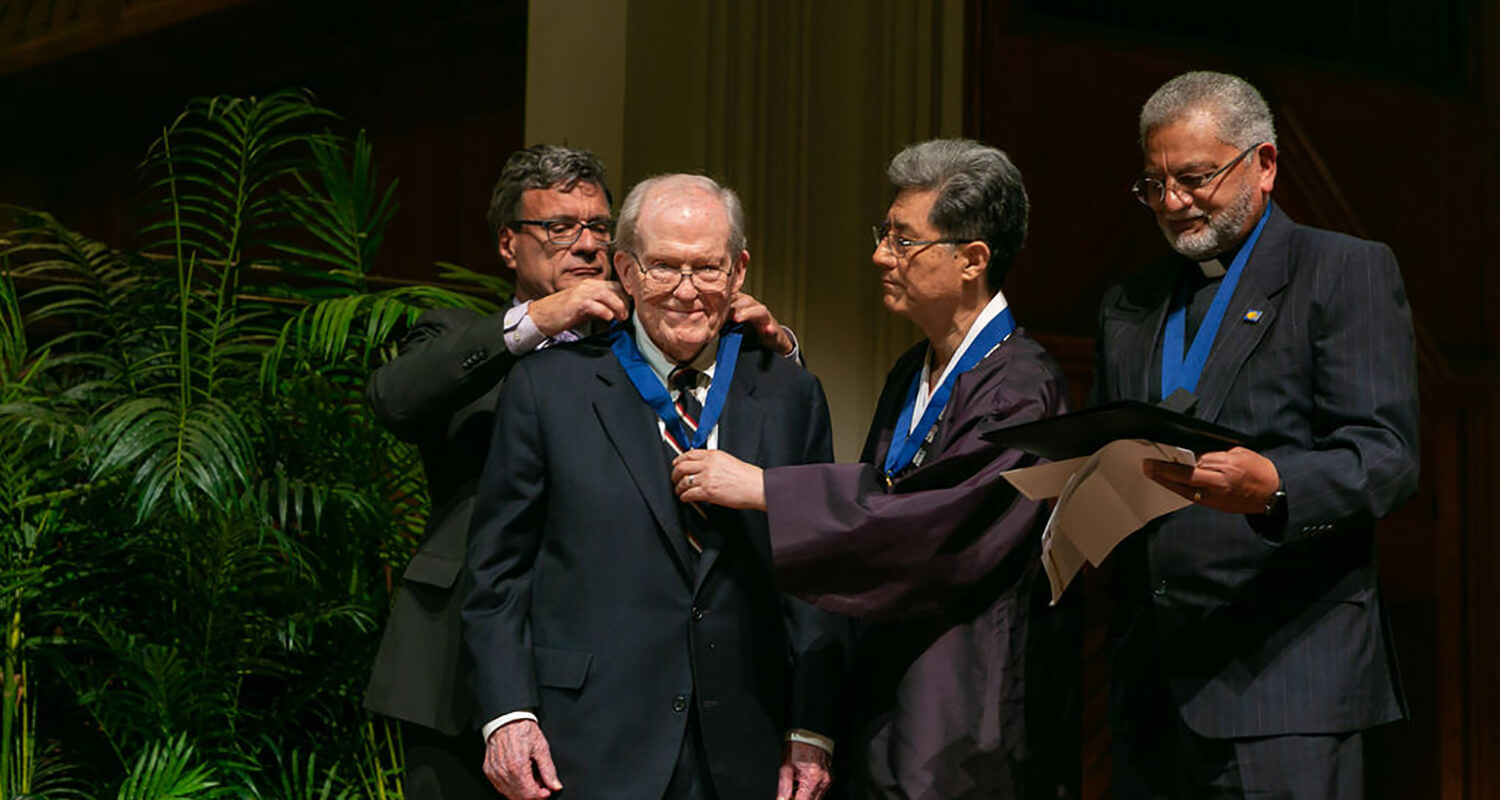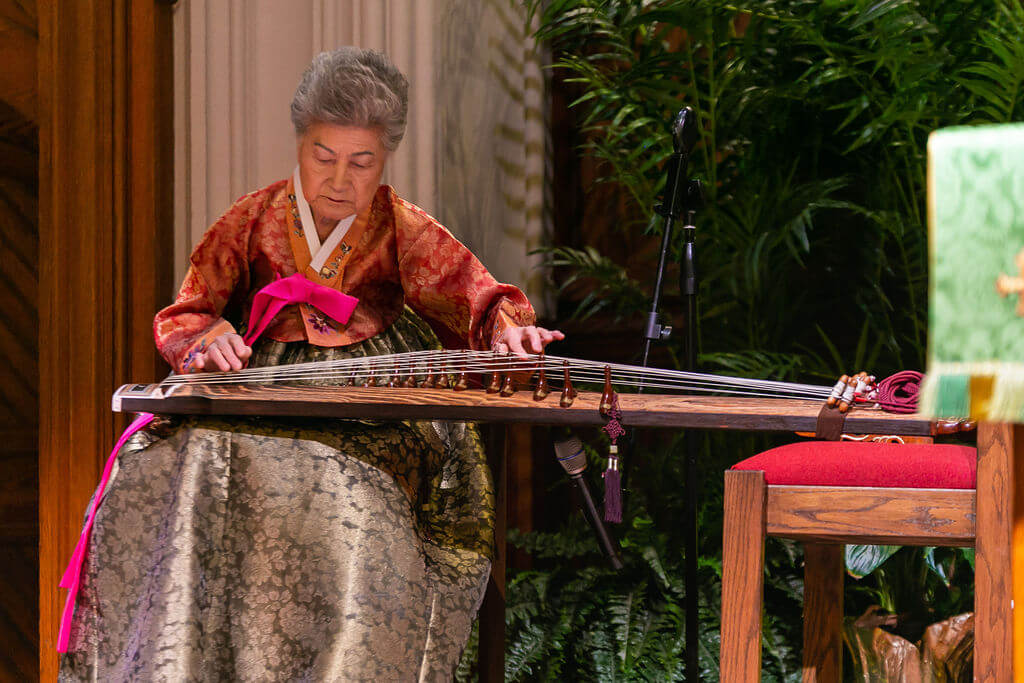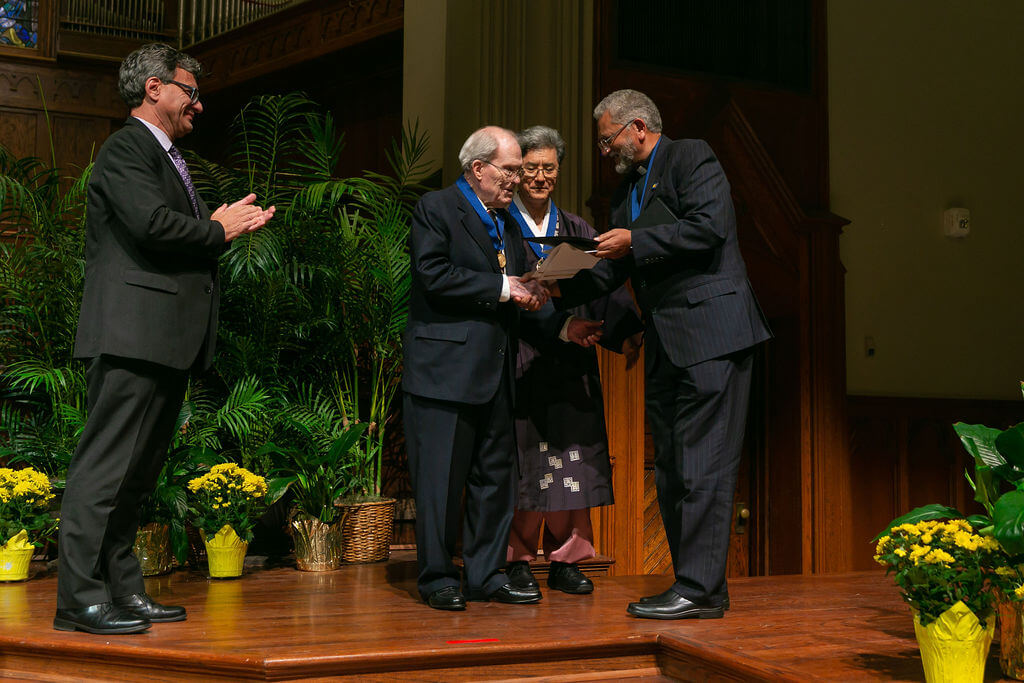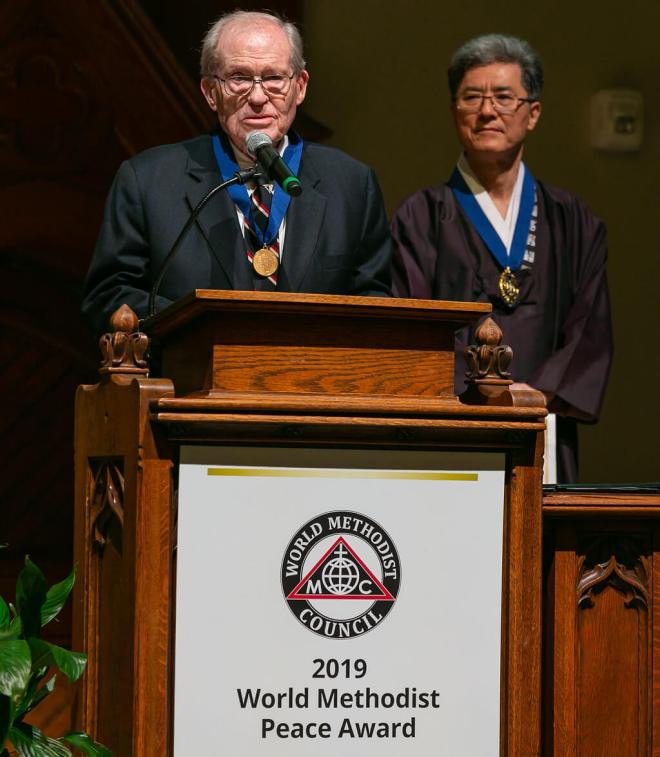The Rev. Dr. James T. Laney receives 2019 World Methodist Peace Award

By Sara Logeman
November 27, 2019 | ATLANTA
For his work as a missionary, educator and diplomat on behalf of the people of Korea, the Rev. Dr. James T. Laney received the 2019 World Methodist Peace Award. Cohosted by the World Methodist Council and The United Methodist Church’s Global Ministries, Laney was honored at a ceremony in Atlanta on Nov. 21. Family, friends and colleagues from all stages of Laney’s life gathered to recognize and celebrate his lifelong commitment to the cause of peace.
In 1977, the first World Methodist Peace Award was given to Saidie Patterson, a 69-year-old peace movement activist who worked for women’s rights in conflict-riddled Northern Ireland.
Only hours after being named the recipient, Patterson’s grand-nephew was killed in Belfast, painfully illustrating the importance of people like Patterson who worked tirelessly to bring about peace in the midst of conflict.
The World Methodist Council, now a connection of 80 million Methodists in 130 countries, has continued to bestow this award upon individuals or groups who have made significant contributions to peace, reconciliation and justice and have shown courage, creativity and consistency in their efforts. Laney joins the company of 35 past award recipients, including Jimmy Carter, Mikhail Gorbachev and Nelson Mandela.

PHOTO: CINDY BROWN
Peacemaking as a vocation
Laney first traveled to Korea as part of the United States Army Counter Intelligence Corps in 1947 and was deeply affected by his experience in the recently divided nation. After returning home and graduating from college, Laney decided to enroll in divinity school and became a Methodist missionary. In 1959, he and his wife, Berta, returned with their family to Seoul, where he served at Yonsei University.
In his early years as a missionary, Laney embodied servant leadership. “He not only taught and guided many brilliant Korean students who later became very important leaders of Korean church and society, but he also humbled himself to find a common human bond with the suffering people of Korea,” said Dr. Jong Chun Park, president of the World Methodist Council.
Thomas Kemper, general secretary of Global Ministries, noted that Laney’s “work as a peacemaker and bridge builder beautifully exemplifies the call of missionaries and the church’s longstanding hopes for its witness in mission.”

PHOTO: CINDY BROWN
This formative experience at Yonsei University would be the foundation for Laney’s decades of service in higher education, namely at Emory University as the dean of Candler School of Theology, 1969-77, and president, 1977-93.
As an educator, Laney deeply believed in the value of moral leadership. According to Dr. Jan Love, Mary Lee Hardin Willard dean of Candler School of Theology, “Laney repeatedly asked of those serving the university, ‘Can we be the leaders we need our students to become?’ He promoted the concept of education to enlarge the mind and the heart – shaping character, being a person fully alive; nurturing integrity, intellect and wisdom; and calling us to servant leadership for the common good.”
Laney continued to embody the principles of servant and moral leadership in his role as U.S. ambassador to South Korea during the Clinton administration, 1993-96. He was instrumental in helping to diffuse the North Korean nuclear crisis in 1994. “Ambassador Laney often stated that to be effective, those representing the United States needed to grasp fully the culture, language and values that stir the souls of the Korean people,” said Love.

PHOTO: CINDY BROWN
Laney’s approach to diplomacy and foreign policy emphasized the search for mutual understanding, empathy and reciprocity within relationships. In order to help bridge and heal the divisions he saw between North Koreans and South Koreans as well as between Korea and other nations, Laney advocated for the way of peace over the way of war.
Former United States President Jimmy Carter penned a congratulatory letter that was read aloud at the ceremony in his absence by Emory University’s president emeritus, Jim Wagner. Carter wrote that Laney’s “boundless faith, compassion for others and spirit are awe-inspiring and have benefited our nation and the world in untold ways.”
A promise for a peace-filled future
Upon receiving the World Methodist Peace Award, Laney stated that “Korea has figured in my life ever since I turned 19. It has figured prominently and in the most profound ways.” His experience of Korea as a place defined by “one people, one language, one culture, and yet, a division” sent his life on a path of pursuing peace for the Korean peninsula.
Laney offered three key lessons learned from his lifelong endeavor for peace. “Peace is not possible as long as we demonize the other side,” he said. “Peace is best achieved through face-to-face conversations. We have to move in peace stage by stage.”
These lessons in peacemaking, honed and refined over decades of experience, will find future expressions through a commitment to peacemaking by new generations. The legacies of peacemakers such as Laney and others are not just stories to tell, but also models to follow.
Sensing an urgent need for peacemakers in our world now and into the future, Laney offered in closing a charge to those gathered in his honor. “I accept this award humbly and gratefully and with a fervent prayer that all of us are called to be peacemakers,” he said. “Peace is the foundation of all human flourishing. Modern warfare is the Armageddon of life. Let us all promise each other that in our sphere of life, we will seek to be instruments of God’s peace and justice.”
Sara Logeman is the content strategist for Global Ministries.

